

Nov. 28, 2006: Atencao!
 Five blocks from the Heritage hotel on Rua Fernando de Albuquerque,
there is a 24-hour diner called Bella Paulista. It becomes my
primary source of sustenance. Whatever type of food or drink you
want, simple or fancy, freshly cooked or prepackaged, you will find it
there any hour of any day. Thank goodness this place is nearby.
Five blocks from the Heritage hotel on Rua Fernando de Albuquerque,
there is a 24-hour diner called Bella Paulista. It becomes my
primary source of sustenance. Whatever type of food or drink you
want, simple or fancy, freshly cooked or prepackaged, you will find it
there any hour of any day. Thank goodness this place is nearby.I walk there just after midnight, passing many gaudily-dressed women loitering around the street corners. I avoid eye contact. Later in the week, my suspicions would be confirmed. These are prostitutes.
Everyone in Sao Paulo seems very friendly. Still, one must exercise caution when strolling around the big city at midnight. I pass several big, tough men who could wad me into a ball and stuff me in their pocket if they wished. But for some reason, I do not feel intimidated. I strut right on by. Why don’t these thugs scare me? Then I realize – duh – I’m ZE DO CAIXAO! If that’s not a confidence builder, I don’t know what is.
At Bella Paulista, I sit next to a nice young lady (a college type, not a prostitute!) who helps me read the menu. Their signature beverage is watermelon juice. What a delicious concoction. It is nothing more than chunks of watermelon liquefied in a blender, seeds and all. I will have to try making this when I return home. Lots of meatless dishes to satisfy my vegetarian tastes. I eat a pita sandwich of grilled eggplant, alfalfa sprouts and other veggies smothered in “buffalo mozzarella.” It seems every dish is encased in great, oozing globs of white cheese. Brazilians eat cheese for breakfast, lunch and dinner. And yet, everyone is slim. I see no obesity. What is it about their lifestyle that keeps them so thin?
I return to the hotel and go to sleep wearing black silk pajamas, just like Ze wears in This Night I Will Possess Your Corpse. I bought them just for this trip. So even as I sleep, I am staying in character! Will a demon drag me to Hell before dawn?
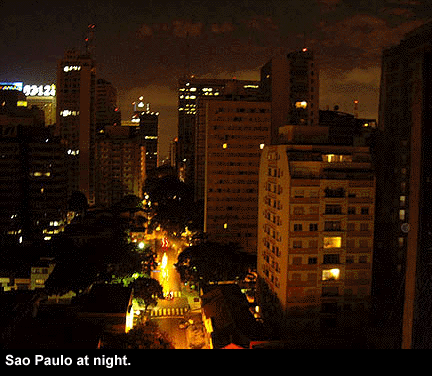 I awake to the low rumble of traffic outside. I am on the 12th
floor, but I can still hear the street sounds. It is a sound I
have heard during other trips to big cities. I like the
sound. In Missouri, all I hear are birds and crickets. Not
that there is anything wrong with birds and crickets, but sometimes it
is nice to hear the grumbling indigestion of civilization.
I awake to the low rumble of traffic outside. I am on the 12th
floor, but I can still hear the street sounds. It is a sound I
have heard during other trips to big cities. I like the
sound. In Missouri, all I hear are birds and crickets. Not
that there is anything wrong with birds and crickets, but sometimes it
is nice to hear the grumbling indigestion of civilization.
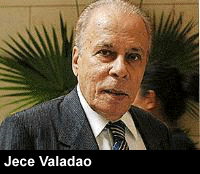 In the hotel lobby, I find the morning newspaper – Folha de S.
Paulo. Jece Valadao’s photo stares at me from the front
page. I
turn to the full story on Page 8. Jece’s obit
story fills the entire page. There is a bio, filmography and
quotes from assorted “important” people commenting on
Jece’s place in Brazilian popular culture. One of the
quotes is from Mojica. I can’t read it, but I see he
uses
words like “charisma” and
“explosive.” Obviously, Dennison was not
exaggerating about Jece being the Brazilian
Jack Nicholson. He was a cinematic icon.
In the hotel lobby, I find the morning newspaper – Folha de S.
Paulo. Jece Valadao’s photo stares at me from the front
page. I
turn to the full story on Page 8. Jece’s obit
story fills the entire page. There is a bio, filmography and
quotes from assorted “important” people commenting on
Jece’s place in Brazilian popular culture. One of the
quotes is from Mojica. I can’t read it, but I see he
uses
words like “charisma” and
“explosive.” Obviously, Dennison was not
exaggerating about Jece being the Brazilian
Jack Nicholson. He was a cinematic icon.That evening, I return to the set. Mojica gives me a very warm welcome. He puts his hand atop my head and keeps it there for a while, as if I were a long lost son. Speaking through a translator, he apologizes for not being more attentive yesterday. He explains that he is still very sad about Jece, so he hopes I understand if he acts withdrawn. I tell him it’s no problem, I understand completely.
The wardrobe department shanghais me. They need to fit me for my costume. I step inside a makeshift dressing room. They want me to strip. Not being a professional actor, I am not used to this. They detect my discomfort and give me a little privacy. I realize I have to just get over it, because there are a half-dozen actors waiting for their fitting after me, everyone is moving frantically and there is no time to indulge my sensitive feelings.
Taking off my clothes is one thing. Now I’ve got a man and a woman putting my clothes on for me. They slip me into Mojica’s costume, but it is “grande” – too big. Way too big. Huge. The wardrobe guy says he will have to go out tomorrow and buy a black suit just for me. They have me wear Mojica’s jacket and cape, even though Ze doesn’t wear those things in the swamp scene. I ask why and wardrobe guy says he doesn’t know. The producers just asked him to have me try on the entire costume. But it’s too big, so off it comes.
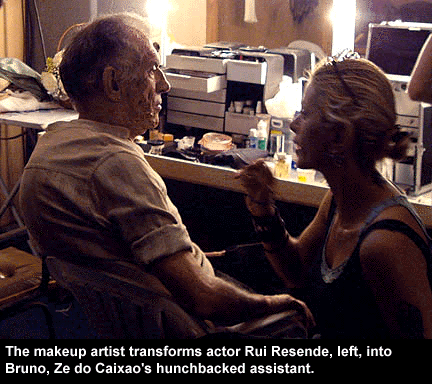 Rui is sitting outside the wardrobe area, along with actress Cristina
Ache. I now know that Cristina is a huge Brazilian actress with a
long list of film credits. But at the time, I had no idea who she
was. Rui knew this and decided to kid me.
Rui is sitting outside the wardrobe area, along with actress Cristina
Ache. I now know that Cristina is a huge Brazilian actress with a
long list of film credits. But at the time, I had no idea who she
was. Rui knew this and decided to kid me.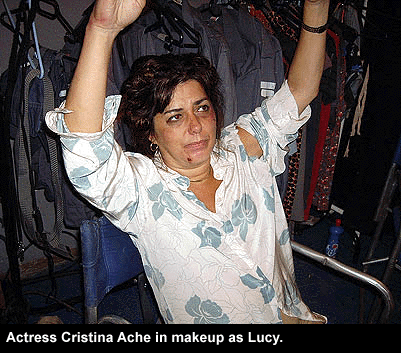 “This is our imported American actor,” he tells
Cristina. “Look at that face!” Rui stands up
and points at my face. He is saying, facetiously, that my face is
so unique they could not find one like it in Brazil. Rui points
at Cristina. “Hey, you know, she’s been in
movies!” he says. “I know! I’ve seen her in
movies!”
“This is our imported American actor,” he tells
Cristina. “Look at that face!” Rui stands up
and points at my face. He is saying, facetiously, that my face is
so unique they could not find one like it in Brazil. Rui points
at Cristina. “Hey, you know, she’s been in
movies!” he says. “I know! I’ve seen her in
movies!”He is giving me a little hazing, but that’s ok. If I were him, I would also be wondering why the heck this nobody from America was hanging around these veteran screen actors. He’s a little cantankerous, but Rui is also a very nice guy. His hotel room is right next to mine. The night before, he told me that I should not hesitate to come to him if I had any problems.
I begin to strike up a real friendship with Mojica’s son, Crounel “Cro” Marins. Throughout the week, he and I will spend many hours talking about his father, the movie business and life in general.
Cro introduces me to other members of the Marins family, including his sister, Merisol, who played the little girl in Exorcismo Negro (The Bloody Exorcism of Coffin Joe). Most of the Mojica kids appear to be in their 30s and 40s.
Cro and Merisol reveal many interesting secrets about the original films. The most surprising is that Mojica’s voice was dubbed by another actor in almost all the Coffin Joe movies until the mid-70s. He did not think he had the proper voice for the character.
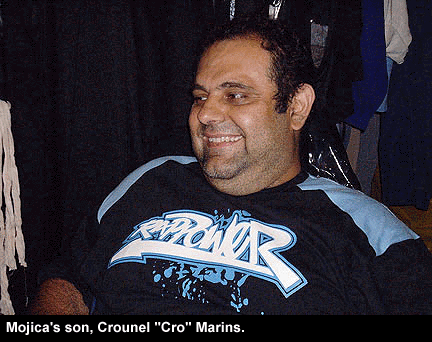 Cro and I talk about collectibles. He confirms that, yes, there
WAS a Coffin Joe doll produced during the period of the original
films. It was about 12 or 14 inches tall. He says they
tried very hard to obtain one in recent years, but no luck. He
has no idea where to find one. Darn.
Cro and I talk about collectibles. He confirms that, yes, there
WAS a Coffin Joe doll produced during the period of the original
films. It was about 12 or 14 inches tall. He says they
tried very hard to obtain one in recent years, but no luck. He
has no idea where to find one. Darn.I ask if there are plans to release more Coffin Joe films on DVD. Cro says they hope the new movie will spur the release of more DVDs, as well as new toys and other merchandising, but they will have to wait and see. There are contractual problems with Fantoma, the company that released the Coffin Joe boxed set in the U.S. I should not repeat the details here, but the bottom line is that the business relationship between Mojica and Fantoma is strained at best.
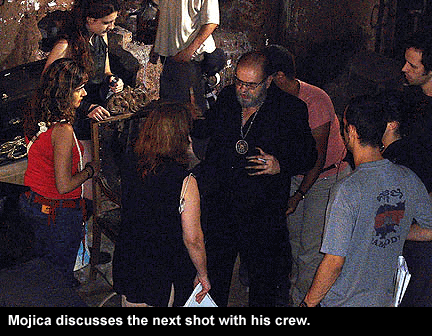 I also formed a connection with Mario Lima, an actor and producer who
has worked on nearly all of Mojica’s films. If you have
seen Awakening of the Beast, you will recognize Mario as
one of the LSD test subjects. He is the young TV producer who
receives Ze do Caixao’s amulet. In This Night I Will
Possess Your Corpse, he is the motorcycle rider who almost runs
down a child before Ze jumps in front of him.
I also formed a connection with Mario Lima, an actor and producer who
has worked on nearly all of Mojica’s films. If you have
seen Awakening of the Beast, you will recognize Mario as
one of the LSD test subjects. He is the young TV producer who
receives Ze do Caixao’s amulet. In This Night I Will
Possess Your Corpse, he is the motorcycle rider who almost runs
down a child before Ze jumps in front of him.Translating through Dennison, I tell Mario about all of his films that I have seen, describing the scenes in which he appears. Mario is stunned. He asks Dennison, “You mean he knows my work?” Dennison says, “Yes, yes, he knows! He knows!” From that point forward, Mario always wanted to sit next to me, wave at me, smile and give me a thumb’s up sign. He was one of the sweetest people among many sweet people.
Though I’m not shooting today, I hang around the set the entire night, from 6 p.m. to 6 a.m. We break for “lunch” around midnight. I think the catered food is pretty good, though Dennison dislikes it. I’m sure the novelty wears off after you eat it every day for a month.
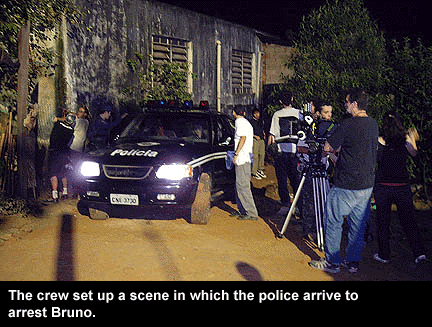
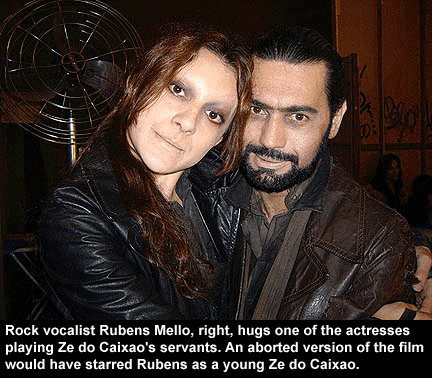 At lunch, I see several young men who look like Ze do Caixao. I
wonder why one of them wasn’t cast as young Ze. I think
some of them might be wondering the same thing. I later learn
that one of the actors, Rubens Mello, was declared by Mojica to be
Ze’s successor a few years ago. But Rubens stepped aside
after realizing that the public wanted the real Ze, Mojica, not a new
guy. He went on to become a vocalist in a rock band. Now
Rubens is playing one of Ze’s disciples. Rubens is a very
nice guy. He has a brooding quality, but also a playful sense of
humor.
At lunch, I see several young men who look like Ze do Caixao. I
wonder why one of them wasn’t cast as young Ze. I think
some of them might be wondering the same thing. I later learn
that one of the actors, Rubens Mello, was declared by Mojica to be
Ze’s successor a few years ago. But Rubens stepped aside
after realizing that the public wanted the real Ze, Mojica, not a new
guy. He went on to become a vocalist in a rock band. Now
Rubens is playing one of Ze’s disciples. Rubens is a very
nice guy. He has a brooding quality, but also a playful sense of
humor.After lunch, I do an interview for the DVD documentary. I find myself unconsciously talking with my hands like Mojica. As anyone who has seen an interview with him knows, he has very distinctive gestures. I wasn’t deliberately trying to imitate him. I think I was so “in the zone” trying to get into the character of Ze that I automatically adopted his mannerisms. I hope the interview doesn’t look too embarrassing. The interviewer seemed very pleased with my comments, so I guess it’s ok.
Much of the filming that night takes place outside on the back lot. Mojica watches the action on a monitor. I sit two seats to his right. In fact, throughout the entire shoot, I am always sitting right next to Mojica, Dennison and the producers. No one else is allowed to do that. Whenever they clear the set, I am told to stay. They definitely gave me royal treatment.
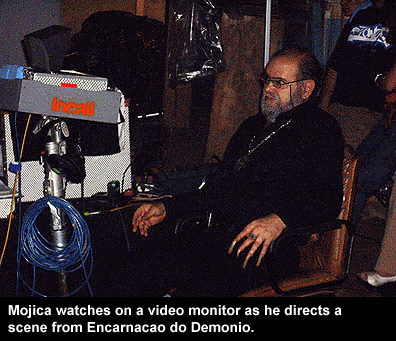
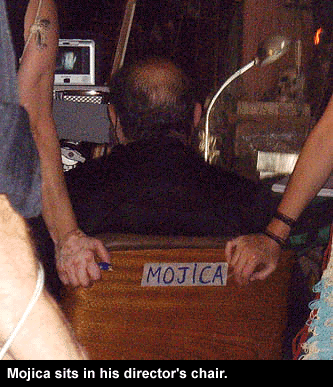 Mojica is very animated when he directs, speaking flamboyantly and
waving his arms. He has a distinctive way of saying,
“Attention! Sound. Camera. Action!”
And then, “Cut!” In Portuguese, this is spelled
“atencao, som, camera, acao, corte.”
Mojica is very animated when he directs, speaking flamboyantly and
waving his arms. He has a distinctive way of saying,
“Attention! Sound. Camera. Action!”
And then, “Cut!” In Portuguese, this is spelled
“atencao, som, camera, acao, corte.”This is how it sounds coming from Mojica’s mouth:
“Ah-tyen-SHO! Zoun. Kam-ee-RA. A-sho.” He says “a-sho” in an understated, almost sly way. Then he ends the take with “Kutta!”
Everyone would be scampering around, desperately trying to finish preparations, when “Ah-tyen-SHO!” would ring out. Ready or not, we are going to roll!
Mid-week, I started imitating Mojica’s “atencao” routine, eliciting giggles from the crew. They agreed I had him down. I made an audio recording of myself imitating him, just so I would remember what he sounded like when he was directing.
“Ah-tyen-SHO!”
I walk around the streets outside the studio during the wee hours. A group of kids gather to watch the filming. They catch a glimpse of Mojica. One of them points and excitedly says, “Ze do Caixao!” There before my eyes – a new generation of Brazilian Monster Kids.

